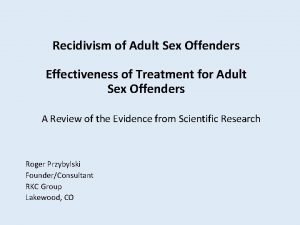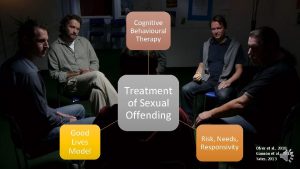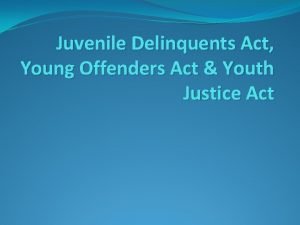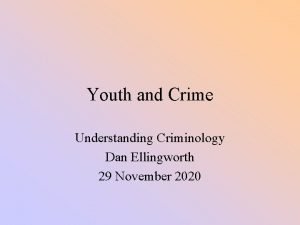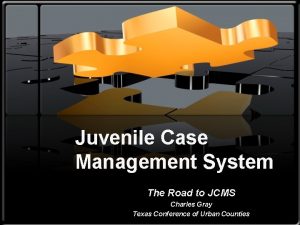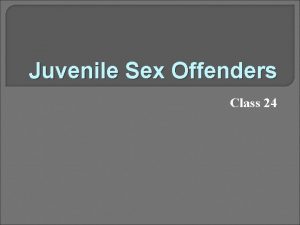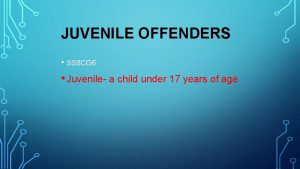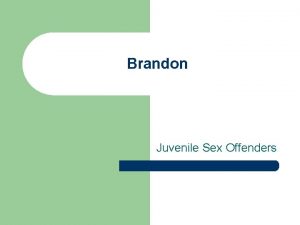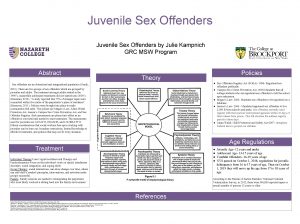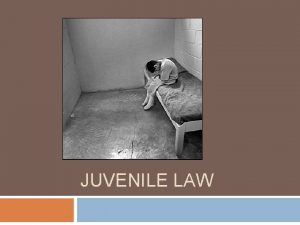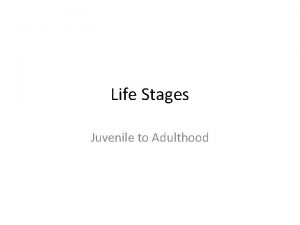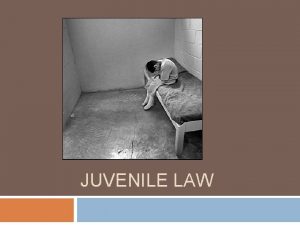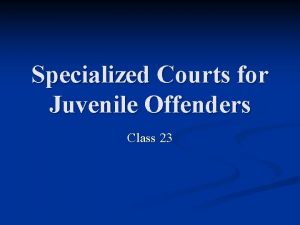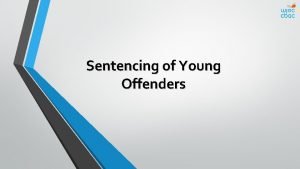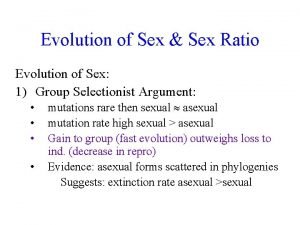Juvenile Sex Offenders Class 24 CASE OF THE


















- Slides: 18

Juvenile Sex Offenders Class 24

CASE OF THE DAY • Girl, 15, became pregnant consensually with boyfriend, also 15, sought prenatal consultation at local clinic • Under state’s mandatory child abuse reporting law, her name was turned over to local CPS • She and boyfriend both charged with sexual assault and prosecuted in juvenile court for having sex with minor • Wisconsin Statutes § 948. 02 – Under the state’s child abuse statutes, it is a felony for anyone to engage in sexual activity with someone younger than 16. It applies to consensual sex, even between teens of the same age. – Between ages of 16 and 18, it is a misdemeanor • Typical sentence, if found guilty in juvenile court, is 6 months of court supervision with conditions: curfew, school and counseling attendance, mandatory separation from sexual partners • Prosecutors claim that parents push for strong court intervention as a mechanism to control their children

• Criticisms? – Do such laws protect children from adult sexual predators? – Some states might require registration, equating consensual teen sex with adult pedophile or rapist • Wisconsin allows judges to waive registration requirement for adolescents who are convicted of having non-forcible sex with a minor who is no more than four years younger or older than the offender (but not in the child abuse law!) • Most states set age difference at three years (ABA Center on Children and Law) – Efficacy of laws to deter consensual sex among teenagers? • Alternatives?

• First Class – The Case of J. G. – Eight Boys and a Girl in Berkeley • Last Class – Specialized Juvenile Courts: • Drug Court • Gun Court – Why not a Specialized Juvenile Court for sex offenders? • What might it look like? Does it fit only those offense categories that comport with a ‘disease’ model of offending? • Would it be smart to ‘medicalize’ sex or treat it as a pathology?

Four Issues • Definitions – Sex Offenders and the Conundrum of Adolescence • Determinism – Assumptions of Inevitability and Stability of Sex Offending • Legal Reactions – Punishment – Beyond Punishment • Imagining Alternatives – Legal and Social Policy

Behavioral Considerations in Defining Sex Offenders • “Age appropriateness” considerations • Heuristic Categories – Non-contact sexual behaviors – Experimentation – Coercion – Violence • Similar explanations? – Co-morbidity of other mental health conditions – Behavioral co-morbidity

Determinism • Twin Issues motivating laws – Inevitability of subsequent offending (prediction problem) – Inevitability of treatment failure – Recidivism of treatment participants over age-graded base rate of re-offending • Do improvements in the prediction of violence translate into better predictions of sex offending – For adults? – For juveniles? • Data – 7 -13% recidivism rates over 5 years, compared to 50% for other offenses

Source: Lisa L. Sample and Timothy M. Bray, Are Sex Offenders Dangerous? 3 Criminology and Public Policy 59 -82 (2003).

Percent of JSO’s with Adult Sex Offense Contacts Percent of Adult Sex Offenses Committed by JSO’s Source: Philadelphia Birth Cohort Study, 1958

• Problems and Issues with Treatment – What are we treating? • • Heterogeneity of causal paths Co-morbid mental health conditions Co-morbid sexual deviance Immaturity dimensions – Social judgment, risk taking, thrill seeking, impulsivity – How are we treating it? • Addiction models • Behaviorist models • Psychogenic models

Legal Reactions • Jurisdictional Boundary – preference for criminalization via waiver for more serious cases • Punishment – Contradiction of jurisdictional transfer and therapeutic regime -- Waiver has its own effects that complicate treatment – Limitations on correctional treatment of juvenile sex offenders in adult correctional placements

• Beyond Punishment – Civil Commitment • Prediction problems are reified into inevitability by statute and case law • Indeterminate civil commitment limited to those who are “violent” or dangerous – Hendricks v Kansas, 117 S. Ct. 2072, 138 L. Ed. 2 d 501 (1997) – Kansas v Crane, 534 US 407 (2002) 269 Kan. 578, 7 P. 3 d 285 • Validity of prediction in sex offender recidivsim data? No – Registration and Notification • Thresholds to mandate registration • Methods of notification • Adolescent-specific jurisprudence (Ohio) (Ohio Rev. Code Ann. § 2950. 04(A)(1)) • Offenses – broader or narrower than for adults? – Different risk thresholds, 3 tiers – Different procedures for notification at each tier – Limitations of registration at each tier

• “ARE JUVENILE OFFENDERS REQUIRED TO REGISTER? ” (http: //www. sexcriminals. com/meganslaw/us/ohio/) – A juvenile who is adjudicated delinquent for committing, on or after January 1, 2002, a sexually oriented offense, who is 14 or older at the time of committing the offense, and who a juvenile-court judge classifies as a juvenile, sex-offender registrant is required to register. This classification includes a juvenile who receives a serious youthful offender dispositional sentence for committing a sexually oriented offense (Ohio Rev. Code Ann. §§ 2950. 01(J), (N)) – A juvenile who is adjudicated delinquent for committing a sexually oriented offense is not required to register unless he or she is specifically classified as a juvenile, sex-offender registrant by a juvenile-court judge. (Ohio Rev. Code Ann. § 2950. 04(5))

• “IS REGISTRATION A LIFETIME REQUIREMENT? ” (http: //www. sexcriminals. com/meganslaw/us/ohio/) – For most offenders and juvenile delinquents, the duty to register lasts for 10 years (Ohio Rev. Code Ann. § 2950. 07(B)(3)) – Offenders and juvenile delinquents who have been found to be habitual sex offenders must register for 20 years. (Ohio Rev. Code Ann. § 2950. 07(B)(2)) – Offenders or juvenile delinquents who have been adjudicated sexual predators and offenders who are required to register for having committed an aggravated sexually oriented offense must register for life. (Ohio Rev. Code Ann. § 2950. 07(B)(1))

• Registration and Notification Defeats the “Stigma Avoidance” Prong of the Juvenile Court – Mortgaging defendant’s future via social exclusion? Balance -how many sex victimizations are avoided via notification? • Ring v Arizona issues – Is civil commitment punishment, and if so, what facts are to be litigated? • Should there be an evidentiary hearing to determine recidivism risk, if risk is animating indeterminate civil commitment? – Is there a conflict between Ring and Crane? • Is registration punishment? Balancing test? Level of scrutiny? • Is Registration Punitive? – See, e. g. , State v. C. M. , 746 So. 2 d 410 (Ala. Crim. App. 1999), ruling that requiring juvenile offenders to register had the character of punishment (because this statutory requirement ran counter to numerous other statutes seeking to protect juveniles' criminal records) and was therefore an ex post facto law. See, also, In Re Ronnie A. , 585 S. E. 2 d 311 (SC 2003), where Court required 11 year old to register as a sex offender.

Alternatives • Bankruptcy Model – Non-criminal – Leveraging power of the court • Greater authority to respond to supply of services • Mutual accountability between court, service providers, and offender – This would be the power of a ‘specialized court’ model – Inherently democratic, places burden on other institutional domains to respond collaboratively with law to develop shared understanding of issue and identify best response sets

Closing Thought – WWFD? • The age of consent in France is 15. There is no sexual offense if a person aged 15 -18 has consensual sex. • The French Penal Code, Article 222. 23 provides a general definition, which applies to all cases of non-consensual sexual penetrations, without regard to age, gender, family relationship, etc. – Certain factors, such as age, may enter into play but only as “aggravating circumstances” for the offence and mainly bear on the sentencing phase. There is thus no special legal offense forcible rape when committed on a minor, the fact that the victim was younger 15 is only an aggravating circumstance. • However, there is analog of statutory rape in France (called “atteinte sexuelle sur la personne d’un mineur de quinze 15 ans, ” see French Penal Code, Article 227 -25). If an adult and a person under 15 have consensual sex, the adult can be liable, not for rape, but for this lesser offence (maximum punishment = 2 years + fine). – The “victim” must be conscious of the nature of the acts accomplished and be of a “sufficient age” to understand what she/he was doing. If the minor is not conscious enough of her/his acts or too young (= subjective standard), the general rape offense statute applies.

• Registries: Since 30 June 2005, France has adopted by decree n° 2005 -627 the use of such registries for sexual offenders ("fichier judiciaire national des auteurs d’infractions sexuelles“, or FIJAIS). It consists of an electronic database which is at the disposal of the judicial administration, the police but also of regional administrations. – Any individual found guilty of a misdemeanor or felony having a sexual character is automatically registered in the database. As soon as one is in the database, one must justify one’s address at least once a year. The government is currently thinking of making the database accessible to an increasing number of public administrations especially those related to education so as to enable them to check whether job applicants in the educational sector are not registered sexual offenders. (For more info go to the governmenl website http: //www. premierministre. gouv. fr/information/actualites_20/presentation_fichier_pour_l es_53514. html)
 Juvenile delinquency graphic organizer
Juvenile delinquency graphic organizer Sex sex sex
Sex sex sex Sex in the greenhouse
Sex in the greenhouse Sex sex sex
Sex sex sex Sex sex sex
Sex sex sex Sex sex sex
Sex sex sex For adult sex
For adult sex Cognitive behavioral therapy for sex offenders
Cognitive behavioral therapy for sex offenders X linked dominant inheritance punnett square
X linked dominant inheritance punnett square Advanced higher biology unit 2
Advanced higher biology unit 2 Sex determination and sex linkage
Sex determination and sex linkage Once a sex offender always a sex offender
Once a sex offender always a sex offender Borstal institution meaning
Borstal institution meaning Young offenders act 1984
Young offenders act 1984 Individual delinquency
Individual delinquency Youthful offenders act 1854
Youthful offenders act 1854 Juvenile case management system
Juvenile case management system Best case worst case average case
Best case worst case average case Hình ảnh bộ gõ cơ thể búng tay
Hình ảnh bộ gõ cơ thể búng tay






